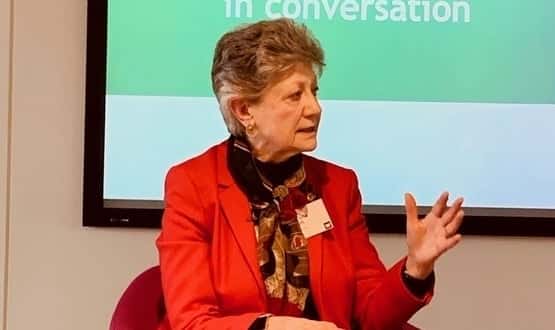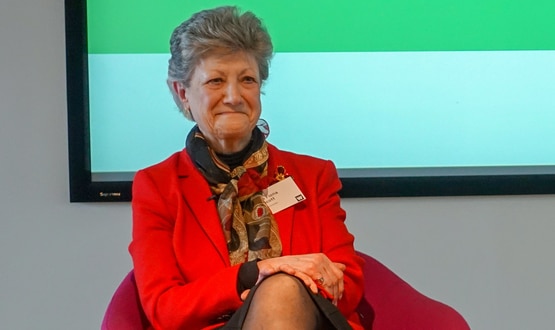Fiona Caldicott appointed first statutory National Data Guardian for health
- 14 March 2019

Dame Fiona Caldicott has been selected as the first statutory National Data Guardian (NDG) for Health and Social Care.
Dame Fiona was appointed national data guardian for health and care in 2014 to ensure the public can trust that health and care information is securely safeguarded and used appropriately.
The Secretary of State for Health and Social Care, Matt Hancock, has now made the position statutory, after government legislation was passed in December 2018.
Dame Fiona said: “The placing of the National Data Guardian role on a statutory footing sends an important signal that there is an independent champion for patients and the public in relation to how health and adult social care data is used.
“I look forward to taking up the role on this new basis and continuing to work alongside others to build public trust that patient data will be used appropriately and effectively.
“This significant development would not have happened without the contributions of many people and organisations for which I am very grateful; the strong support for the role has been heartening to see.”
By making the role statutory means the NDG will be able to issue official guidance about the processing of health and adult social care data.
This means public bodies, such as hospitals, GPs, care homes, planners and commissioners of services, will have to take note of guidance that is relevant to them.
So will organisations such as private companies or charities which are delivering services for the NHS or publicly funded adult social care.
Health Minister, Nicola Blackwood, added: “I am delighted to see the role of the National Data Guardian being placed on a statutory footing.
“Placing the National Data Guardian on a statutory footing strengthens the role as an independent and authoritative voice for the patient on how their data is used in the health and care system. It is right that patients are confident they have a strong champion not only to advise them but also to challenge the system and ensure that confidential information is safeguarded and used appropriately.
“In establishing this role Dame Fiona has firmly rooted the National Data Guardian within the health and care system as an essential building block for building public trust for the use of patient data.”




7 Comments
I think it’s clear that “sufficiently anonymised” data is not personal data – The lie is the pretence that you can sufficiently anonymise a rich clinical dataset such as that found in an typical EHR – There is more than enough information about me in the public domain (information that I’m happy to be in the public domain) to re-identify my GP record where all of the strong identifiers have been removed.
We need to be honest about the risks, mitigate them (there is lots we can to do), sell the considerable benefits of allowing sharing and secondary use and make it easy for those who are not convinced to opt-out.
I am emboldened to disagree by the fact that two leading experts in clinical informatics agreed with me; they both independently said to my face, that they agreed that “sufficiently anonymised” data is neither anonymous nor unidentifiable – as you also concede. I think that makes it personal data, even if you have to re-identify it. This is not just semantics when this linguistic trick is being used to offer people an opt-out that can always be ignored, automatically overridden, or circumvented using “sufficiently anonymised” data. When you allow that this is personal data, the automatic override, based on GDPR Article 6(1)(c) (statutory obligation) can also be shown to be illegal. This is deliberate duplicity, offering an opt-out that will never be upheld, and using words in the manner of Humpty Dumpty to mean anything you want them to mean. As Humpty said, “The only question is, which is master – that’s all.” It is no use making it easy to opt out out if the opt-out itself is just an underhand con trick, which is exactly what it is.
‘Dame Fiona said: “The placing of the National Data Guardian role on a statutory footing sends an important signal that there is an independent champion for patients and the public in relation to how health and adult social care data is used.”‘
That is of course the signal being sent, but every signal being sent by the DHSC is intended to deceive. The NDG is the instrument of the DHSC, used to attempt to convince patients they are being treated fairly when nothing could be further from the truth. I have no confidence in the NDG whatsoever. There is no champion of the rights of NHS patients, and the DHSC have been most careful to ensure that their data pillaging can never be successfully challenged by anyone. Anyone who tries to challenge the DHSC/NHS will find that nobody will give then a hearing, not the Secretary of State, not the DHSC, not the Ministry of Justice, not NHS England, not NHS Digital, not NHS Anything, not NHS providers, who are under contract to the Health Service, not the ICO, not the Parliamentary and Health Service Ombudsman, not the CCG’s, not the Caldicott Guardians, not the NDG. Raise objections to what the Government or the DHSC or the NHS are doing and you are on your own with no de facto rights whatever. Try to claim any rights and everyone is resolutely deaf, automatically overruling any objection or deciding that it is someone else’s problem. This is a massive, far too powerful, totally inhuman steamroller, designed for data harvesting in total disregard of the rights, freedoms and legitimate interests of the data subjects – NHS patients. You cannot even beat it by dying.
Wow!!!! Somebody’d got their fingers burnt in the past…….
Perhaps if you’d met Dame Fiona and understood how hard she has worked to establish the indepenence of her role you might have a different view.
Care.data was dropped following her direct criticism and she was very critical of the MoU between the DH and the MoJ.
By all means use this forum to share your conspiracy theories, but choose your targets more wisely or you will look foolish.
1. Care.data has not been dropped, only the name has been dropped and the intentions have become progressively worse.
2. Dame Fiona was responsible for setting up the “national data opt-out” in such a way that it will never be honoured, because she subscribed to the lie that “sufficuiently anonymised ” data is not personal data. She thereby supported the Government policy of lying to NHS patients in order to grab all patient data without consent, and do what they please with it.
3. You don’t win arguments by labeling anyone who disagrees with you a “conspiracy theorist”. What exactly makes you feel entitled to patronise me because you have a different view?
3. I have no delusions about winning this argument with you. Your reaction to almost any post on here is to link it to your belief that there is a conspiracy to steal personal data from NHS patients and sell it to the highest bidder. Is it really patronising to describe this belief in a conspiracy as a conspiracy theory?
Comments are closed.